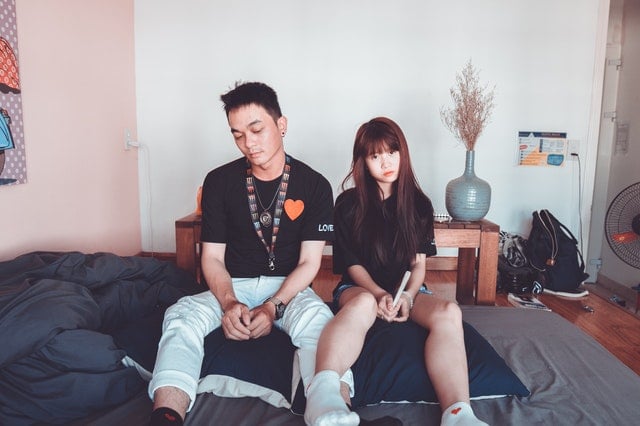When things turn sour with someone, it’s easy to simply look at them, shrug your shoulders, and tell yourself:
“It was inevitable; they were at war with themselves—it was never going to work.”
And, you know what? Maybe there’s some truth in that.
Perhaps your relationship floundered because there were multiple psychological battles waging within the other person. If someone is at war with themselves, then they’re not necessarily going to find it easy to discover peace in the arms or company of another.
However, I doubt that’s the entire truth.
And that’s why I think there are a multitude of problems with this mindset.
For a start, it’s an incredibly cold and dismissive way to describe someone else’s problems and tragedies. It’s brutally reductive, and invalidating, and even more so if that person endured genuine trauma when you knew them.
It’s also invalidating because it is, in most likelihood, unfair. It’s rarely just “themselves” that they’re battling—none of us ever are.
Dig a bit deeper and you’ll find that most people are fighting battles on more than one front, and in ways and against influences and people others may not understand. But if we knew this person intimately, there’s a good chance we already knew what some of those battles were.
To dismiss all of that and reduce it to them simply fighting a war on one front—with “themselves”—invalidates all that other stuff. And, quite frankly, who are we to say which of all those things affected them the most?
For all we know, that battle was the least of their concerns, and in the grand scheme of things, not necessarily the reason you and they no longer speak.
So, if we consider ourselves kind and compassionate people, let’s switch that line of thinking. I mean, how would you feel if someone else dismissed the range of battles you have to face every day, and instead only saw the one you’re fighting internally? One that they can’t even see, and so are really in no position to judge anyway.
The fundamental flaw in thinking this way when a relationship ends, is this:
We are all collateral damage in someone’s battle with themselves at some point.
Who hasn’t felt the wrath of an unhappy, dissatisfied boss?
Who hasn’t been on the receiving end of a partner’s flawed attachment style?
Who hasn’t had a friend, struggling and facing genuine difficulties in their life, who didn’t take some of it out on you?
And that’s all before we even begin to consider the traits that were passed down through generations in our families, traits we weren’t even alive for when they first arose, that still impact us.
We’ve all been collateral damage in some shape or form. And we’ve all inflicted this pain on others.
If you genuinely believe that no one else has ever been collateral damage in your battle with yourself, with your life, well…you’re probably lying to yourself. Because they have been.
That time when you were facing financial difficulties? That was a tough time for you, but others were affected by that as well.
That time you had a falling out with a family member? That must have been horrible, and it’s only fair that as you were the one enduring the pain you should be front and center. However, that situation impacted others.
That time you started a new job and found it difficult to adjust to the new surroundings, the new demands, and a role you’d never done before? You weren’t the only person in your life affected by that.
And that time when you were “in a bad place”? That sucks, I feel for you, and I’m so happy you’re doing much better now. But, you know what? Yes, others got pulled in to that place as well.
We are all collateral damage at some point. And we all inflict collateral damage on others at some point. To minimize that is lazy and does a disservice to both you and those around you.
This situation becomes even more problematic when you consider the role you played in this other person’s life. If you were someone they trusted or needed, then—unless you are the paragon of saintliness—you impacted them in some capacity, just as they impacted you. (That whole “cause and effect” thing is how human interaction works.)
If you only ever treated this person wonderfully, and they, in turn, only ever treated you like crap, then maybe you can blame the relationship’s demise on their own personal battles. Or if there was an issue with addiction or mental health, and you remained steadfast in your support, but they repeatedly refused to seek help, then fair enough.
But otherwise, we need to accept that we all do things that add to other’s emotional workload.
“At war with themselves.” As long as you can say, hand on heart, you were in the trenches with them, don’t think this. It utterly underplays the importance you once had in their lives, and passes the buck.
I know this because I’ve been guilty of it.
I once knew someone whose life was the proverbial dumpster fire. And I got burnt many, many times. Lazily, I told myself, “Sometimes we are collateral damage in someone’s battle with themselves.” In the short-term, it made me feel better. I felt so empowered that I even posted it on my social media, because it was, in many ways, true.
Then someone else said it about me.
And, fueled by the reductive indignity—“At war with myself? That’s the only thing I had to contend with during that time? How can they say that?!”—and the fact that this person wasn’t exactly the most reliable ally, I saw what an awful thing it was to say, or think, about another.
I felt like sh*t.
It made me realize that in the case of the original person I thought (and posted) this about, it simply wasn’t true. Their life had been falling apart, and I had been on the receiving end of that a lot. It wasn’t simply that any stress they were feeling was passed on to me, it was also that, in some bizarre situations, I’d ended up being blamed for some of those issues, many of which had nothing to do with me at all.
It wore me down. But…
I had also played a significant role in that same dumpster fire of a life; how could I not have?
No, I may not have started each individual flame, but could I honestly say that I had always done my utmost to help douse them? Had my own life, which was itself a dumpster fire, added more fuel to theirs? Had I always truly made the effort to understand each of those fires—their causes and effects?
If their life was going up in flames, as someone who played a significant role in it, I don’t get off scot-free. The moment I forged a relationship with them, I ceased being an innocent bystander, or mere collateral damage in their wars—I was an active combatant. If I didn’t want to be, I shouldn’t have been there.
We all have our battles to face, but we have relationships so none us have to face them alone. And while we’re not responsible for a mess in someone else’s life that we didn’t create, at the very least, we shouldn’t add to the mess.
With the person in my life, I may not have caused those wars or started those fires, but did I fight as well as I could have? No—and that removes my right to simply distance myself from it all and say that I was no more than collateral damage. Because I was never just that anyway; we never are.
We’re all at war with something, whether it be money, our families, our jobs, the Coronavirus-shaped world we now live in, or ourselves. Firstly, be kind, and consider that.
Second, none of us live in isolation; due to the inter-connectedness of the human race, our actions have ripples we cannot always perceive. Even those really, really small ones. That terse, unfair text message you sent the day after a rough shift? For all you know, that might have become a battle for the other person to face. We are rarely inconsequential collateral damage, especially not if we willingly decided to actively engage in a relationship with someone.
And, sometimes, it helps to see that in the wars someone else was fighting, we may not have been the comrades they needed.
Seeing this can open us up to the stuff we need to work on—the stuff that makes us a better person. The stuff that, when we again find ourselves in those wars (as we inevitably will in relationships), will help us show up the way others need us to.
The stuff that allows us to fight alongside those we love, instead of against them.
~







Read 4 comments and reply